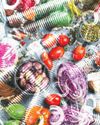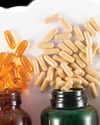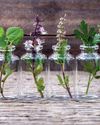
C stands for cancer; frustratingly, it also stands for complicated or even confusing, and that's because understanding the processes of cancer and predicting who is likely to get it are not straightforward.
As we know, smoking poses one of the biggest risks for developing cancer, and around 48 percent of smokers will get the disease—which also means 52 percent won't. The same goes for processed food. It's another big risk factor.
Researchers from Imperial College London analyzed a database of nearly 200,000 participants and discovered that for every 10 percent increase in ultra-processed food (UPF) in a person's diet, there was a 6 percent rise in cancer deaths overall (see box, page 18).
Worrying stuff, but it also means many people who eat processed food never develop cancer—even though, as a population, we are eating alot of it. In the US, the average person is consuming around 57Ib (26 kg) of sugar every year, and in the UK it's about 341b (16 kg), mainly from processed food.
Despite this vast overconsumption, researchers say they have seen only an "association" between poor diet and a host of health problems, such as obesity, heart disease, type 2 diabetes and some cancers, but they haven’t established a direct cause-and-effect relationship.
It’s in the process
Researchers at the National University of Singapore have taken a step closer to understanding how some people dodge the cancer bullet, even if they’re not living a great lifestyle, while others become its victims.
It’s all to do with the way the body processes sugar. When the body breaks down glucose to create energy in a process known as glycolysis, it also produces the reactive compound methylglyoxal (MGO).
この記事は What Doctors Don't Tell You Australia/NZ の Aug/Sep 2024 版に掲載されています。
7 日間の Magzter GOLD 無料トライアルを開始して、何千もの厳選されたプレミアム ストーリー、9,000 以上の雑誌や新聞にアクセスしてください。
すでに購読者です ? サインイン
この記事は What Doctors Don't Tell You Australia/NZ の Aug/Sep 2024 版に掲載されています。
7 日間の Magzter GOLD 無料トライアルを開始して、何千もの厳選されたプレミアム ストーリー、9,000 以上の雑誌や新聞にアクセスしてください。
すでに購読者です? サインイン

Metalhead
Could toxic heavy metals be making you ill? Here's how to spot the signs and symptoms, says Dr Leigh Erin Connealy, and your action plan for effective detox

Good bones
There's a lot of fearmongering when it comes to the risk of fractures in older women, says Marcelle Pick. Here's what you need to know and how to look after your bones naturally

Supplements in the spotlight
Confused about supplements? Dr Jenny Goodman has the lowdown on why we need them, how to choose a top-quality product and the ingredients to avoid

Essentially balanced
These essential oils can help you soothe stress, balance your hormones and feel like your best self again

An integrative approach to breast cancer
Blending the best of integrative medicine with the best of conventional medicine gives the greatest chance of healing breast cancer, says Dr Leigh Erin Connealy

THE NEEDLE'S EDGE
An intriguing new theory says it's not what's in the jabs but how the needles are inserted that explains the rampant and varied Covid vaccine damage. Celeste McGovern investigates the Bolus Theory

The illusion of the magician
Howrelative risk makes a drug seem effective when it’s not

Of pesticides and PMS
Detoxing from a hormone-disrupting herbicide, along with getting the right nutrition, was the answer to a patient’s debilitating PMS, says Dr Jenny Goodman

Not just a phase
Is your workout working against your hormones? Debra Atkinson explains why and how to exercise with your hormonal cycle for the best results
